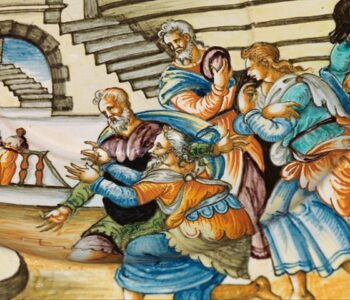 Post
Post
What is the best news you’ve ever heard?
In a time when our newsfeeds are overflowing with gloomy and shocking reports, a little good news is always a relief: something to make us smile, to take our minds away from the fearful and miserable reality that seems to loom over so much of the world right now. I remember how the birth of my nephew during the height of the pandemic brought our whole family such joy, even though we weren’t able to be present with them at the time. Our WhatsApp group was filled with pictures of this beautiful baby boy and his glowing parents. For a few days, the COVID death toll count and the frustration of being stuck at home were banished to the back of our minds. The news was a tonic for our hearts, a little light in the persistent darkness. This was new, beautiful, hopeful life in the midst of depression and despair.
But as I think about it, this whole arrangement seems to be the wrong way around. Why is it that the darkness seems so dominant and light often seems so rare and sporadic? Is this really the reality of our existence? Or is it possible that we are missing something? Is it possible that there is some good news that is so good that it swallows up and overshadows even the worst of the bad news? This is the claim of the gospel of Jesus Christ. The gospel promises that there is a hope and a goodness that is far greater than even the darkest darkness.
Come and join us from the 22nd of May 2022 as we begin Christianity Explored: a 7-week journey exploring the answers that the gospel of Jesus Christ gives to the big questions of life. Everyone is welcome, including skeptics and non-Christians. There is no charge and we will be providing a light meal. Children are welcome to attend with their parents.
When does the course start and how long does it run for?
The course will start on the 22nd of May 2022 and will run for seven Sundays. We will take a break over the Jubilee weekend (the 5th of June) so our schedule will look like this:
Session 1: 22.05.2022 | Session 2: 29.05.2022 | Break: 05.06.2022 | Session 3: 12.06.2022 | Session 4: 19.06.2022 | Session 5: 26.06.2022 | Session 6: 03.07.2022 | Session 7: 10.07.2022
What time do the sessions start and where will they take place?
Each session will start at 5pm and we will be done by 6.30pm. You will find us at the Community Association of West Hampstead, 17 Dornfell Street, West Hampstead, NW6 1QN. The closest stations are West Hampstead (Underground, Overground & Thameslink). The C11 bus runs near the venue. Parking is not controlled outside the venue on Sundays.
What can I expect from a session?
The sessions will be relaxed and informal. It is more about conversation and building connections with others who are asking similar questions than it is about lecturing, preaching or liturgy. You will not be asked to pray or sing or to perform any religious rite or follow a liturgy. The sessions are strictly limited to one and a half hours (including mingling time). We will also be providing a light meal.
Where does this course come from?
The course is provided by Christianity Explored Ministries. You can find out more about the content here.
What is the cost?
There is no cost. It is completely free. You may make a donation to help cover the cost of your meal if you wish.
Do I need to register?
No. You are welcome to just show up on the day.

